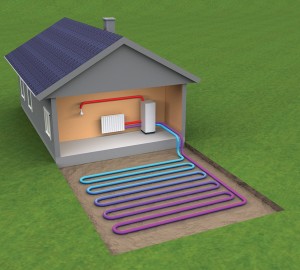When you start thinking about shrinking the carbon footprint of your house, you come across a variety of options. The only way to make a sensible choice is to weigh them up against each other, and work out what brings the best return for investment, both in money and in carbon saved.

The benefits of a ground source heat pump depend on the amount or space you have and the kind of fuel you are replacing.
In the early phases of our planning for the Westacre Project, we looked into the benefits of installing a ground source heat pump (GSHP). GSHPs extract heat from the ground in your garden to heat your home. The technology doesn’t use any fossil fuels and requires little or no maintenance. In the end we decided not to have one. Why not?
GSHPs work most efficiently in a well insulated home. They work at much lower temperatures than your conventional central heating. The system can’t heat your house effectively if it is draughty or loses lots of heat through solid walls like ours.
Clearly, Westacre’s 1930s house wouldn’t be up to that. We would need to do something drastic to improve our insulation. We are planning external wall insulation and good quality draught-free windows, as well as insulation under the floor and in the loft.

Installing external wall insulation on your solid walls can save a lot of carbon, and of course, money.
It turns out that installing external wall insulation to a high standard is very effective indeed. If you were to insulate a standard three bed semi that is heated with gas, you could save up to £460 in heating bills and 1.9 tonnes of carbon dioxide per year. That is a significant saving.
Our house is larger and is detached, so our savings will be even greater. We certainly noticed just how leaky it is at the moment when we discovered we were using over £6 a day to heat the whole house during the cold winter.
External wall insulation is not cheap. If you get a contractor in to install the insulation, for that typical semi, it may cost you between £9,400 and £13,000. That’s an eye-watering cost, but our whole aim is to spend the money up front so our house will be very cheap to run and virtually carbon neutral in the long run.
Of course, we could have a ground source heat pump as well. It would work effectively for a well insulated house. But the system is also very expensive: £9,000 to £17,000, and wouldn’t give us that much added benefit.
The typical gas-heated semi mentioned above would in fact lose money from operating its moderately efficient GSHP as compared with just burning gas. If the GSHP was performing at best efficiency, it could save about £110 per year and 850kg of carbon. GSHPs are most effective if you are currently heating your house solely with electricity. If you are in that situation, it could save up to £650 per year.
When Westacre is well insulated, it probably won’t need as much heating as a GSHP can generate. It would not be worth the extra investment. Just insulating the house well should keep us warm for most average weather conditions. We will have to live with our insulation for a while to work out how much extra heating we will need. For extra cold days, we intend to install backup in the form of solar hot water and a wood burning stove with a back boiler.
Our intention is to make the house as carbon neutral as possible. This obviously will reduce our impact on the climate. But on top of that, it will protect us from any fluctuations in fuel prices in the long run. For now, we may be able to save up to £500 per year, but who knows what our investment will be worth when gas prices rise?
Do you have any experience with either external wall insulation or ground source heat pumps? Please share below.
Sources:
Figures and insulation image from the Energy Saving Trust. Their web site is a great source of information, starting from turning off your lights all the way to generating your own energy.
GSHP image from UGE.
